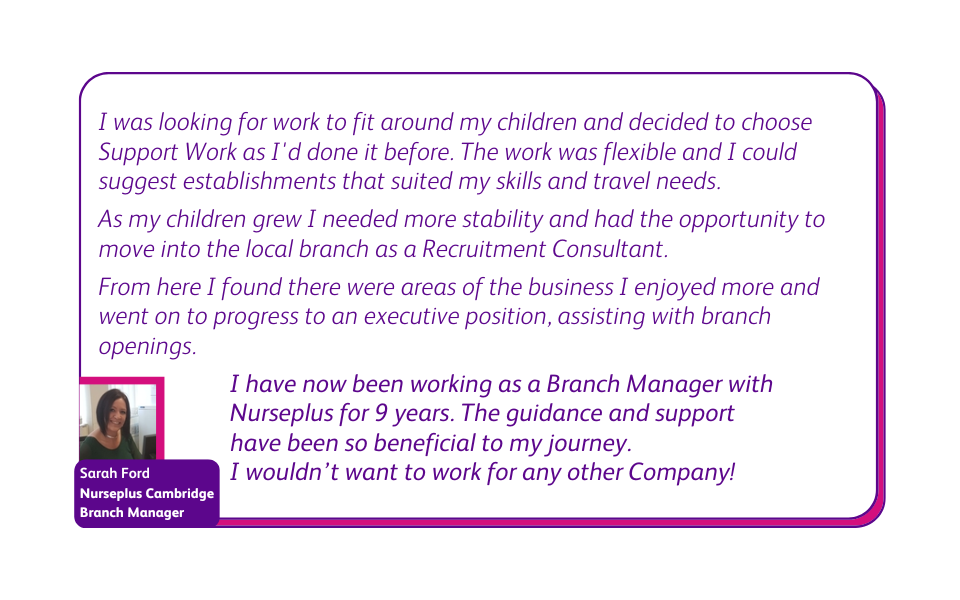Care Career Guides: What is a Support Worker?
Here you will find answers to any questions you have about becoming a Support Worker. You'll learn all about the skills you need, pay insight, and the varied responsibilities and duties of a Support Worker below. Discover if this could be the ideal role for you.
What are the duties of a Support Worker?
As a Support Worker, you’ll find every working day is different, a perfect job for people who enjoy a bit of variety and like to take on new challenges. Every person requiring care is unique and has their own set of unique needs, which means no two days are ever the same for a Support Worker. For example, one day you might be assisting a person with physical disabilities, helping with personal care, eating, drinking, and moving around, the next you could be providing some much-needed companionship to an elderly person. The duties of a Support Worker really do encompass so much.
Another duty of a Support Worker, if not the most important, is to look after the well-being of people in care in every aspect of their daily lives. It’s your goal to enable that person’s independence wherever possible, providing support and encouragement every step of the way.

Other support worker responsibilities include:
Supporting general life skills such as shopping, cooking, and travelling
Engaging in social activities or supporting interests and hobbies
Undertaking general household chores, like emptying bins or changing the bed
Helping make important appointments with doctors and banks
Providing emotional support for the individual and their families
Assisting senior healthcare professionals and nurses in your place of work
Depending on the person you are caring for, the duties of a Support Worker will change and adapt, meaning you too must change and adapt to accommodate that person's needs. People in care can sometimes have difficulty communicating, socialising, or carrying out day-to-day tasks. It’s your duty as a Support Worker to recognise these difficulties and help the person overcome them where possible.
At Nurseplus, we offer Support Worker jobs in all sorts of healthcare establishments across the UK. These can range from care homes, mental health support groups, assisted living establishments, and community care groups.
Do You Need Qualifications to Be a Support Worker?
Luckily, if your heart is in the right place, becoming a Support Worker doesn’t need any specific qualifications. There are benefits to having experience in care, or NVQs in a healthcare-related subject, but at Nurseplus we will always provide new-to-care training for all our successful applicants.
All Support Workers who register with Nurseplus also have the potential to further their personal and professional development with access to a variety of care-based training courses. At Nurseplus we encourage career progression with many of our branch and permanent network staff having first started out as Support Workers first.

What Skills Do I Need to Become a Support Worker?
Simply put, you just need to be a nice person. Our own Nurseplus values really encompass the main skills needed to become a Support Worker.

It seems obvious but caring can encompass so many things. From the ability to listen to having a genuine interest in the person you are caring for, caring means so much more than just showing up.
Working with Nurseplus, you’ll cover shifts in a number of healthcare settings providing mental health support and adult social care, elderly care, and looking after young people in nurseries. It’s so important to us that our people showcase certain caring qualities that, we believe, set us apart from other care providers.

When you become a Support Worker, you will be the main point of communication for the person you are caring for. This means you’ll need to be trustworthy, not only in the eyes of the establishment you are placed in but also to the person you are caring for, your colleagues, and the individuals’ friends and family.
You’ll also be expected to have great communication skills, both verbal and written, for detailed record-keeping purposes. As a Support Worker, you’ll become part of a team, and the people you work alongside will need to rely on you for assistance and support when they need it.
In healthcare, rules, regulations, and codes of conduct are incredibly important. For this reason, best practices are to stay up to date with any changes in these areas. At Nurseplus we regularly communicate important changes to all our staff and update carer training where required.
.png)
One of the most important skills you need to become a Support Worker is maintaining positivity at all times, which we appreciate can be challenging when you work in care. Your attitude and mood at work can and will affect your colleagues, the people you care for, and the reputation of Nurseplus as a whole. That’s why we consider positivity as one of the core values of Nurseplus.
The branch teams at Nurseplus are well known for their optimism. Our branch staff work hard to make the day-to-day as interesting as possible, always looking after their carers with little treats to celebrate special days or achievements.

Another important personal skill that will help you your way to becoming a Support Worker is empathy. This is a key skill that we expect all our workers to apply to everyone and anyone they meet. It’s your job as a Support Worker to build and nurture positive, lasting relationships with those you work with and care for, as well as their families.
Finally, and most importantly, when you are hoping to become a Support Worker, you should have a non-judgmental attitude, caring for anyone who needs it regardless of their needs or abilities.
How much does a Support Worker get paid?
With Nurseplus, the average hourly rate for a Support Worker can range from £10 - £18.49 per hour. Your rate of pay will be based on your level of experience and where you apply.
Better still, Support Worker jobs at Nurseplus come with access to online training and development courses meaning you will always have the opportunity to earn whilst you learn. You’ll be able to train in your own time, completing courses to further your career, and distance learning is available too.
Internal progression is strongly encouraged and supported at Nurseplus, with many of our agency candidates staying on to become Recruitment Consultants, Branch Managers, Area Managers, and even Executive level staff.
We want to help you become a Support Worker and then work with you to build your skills and help you enjoy a rewarding, lasting career in care.
What is the difference between a Support Worker and a Healthcare Assistant or Care Worker?
Mainly, the skill set is what sets Support Workers and Healthcare Assistants (HCAs) apart. As an HCA you may be expected to hold an NVQ or the equivalent. An HCA would also be expected to offer more clinical support to Senior Nurses in establishments such as hospitals or more complex care establishments.
At Nurseplus, some of our Healthcare Assistants roles will not require any formal qualifications and on-the-job training will always be offered to those who want or need it.
You can find all the latest Support Worker jobs near you here. Once you have made your application, our Nurseplus Recruitment Consultants will reach out to begin your interview journey and get you on the way to becoming a Support worker.
Posted on September 14, 2022 by Nurseplus
